现在完成时1
- 格式:pptx
- 大小:69.27 KB
- 文档页数:8
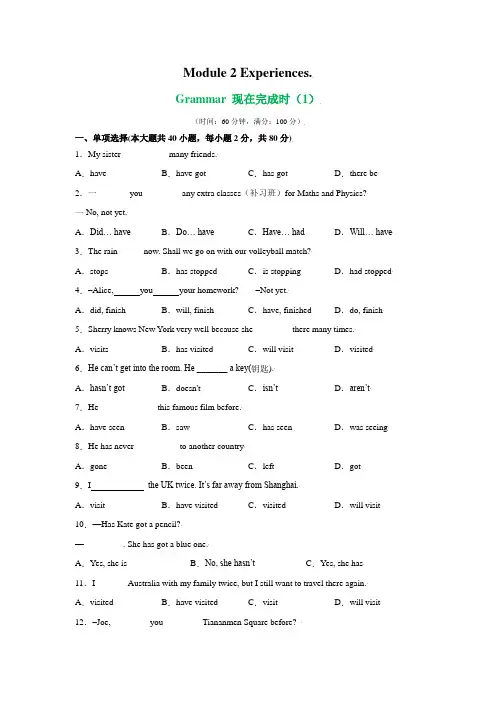
Module 2 Experiences.Grammar 现在完成时(1)(时间:60分钟,满分:100分)一、单项选择(本大题共40小题,每小题2分,共80分)1.My sister __________ many friends.A.have B.have got C.has got D.there be 2.一_______ you ________ any extra classes(补习班)for Maths and Physics?一No, not yet.A.Did… have B.Do… have C.Have… had D.Will… have 3.The rain _____ now. Shall we go on with our volleyball match?A.stops B.has stopped C.is stopping D.had stopped 4.–Alice, _ you _ your homework?–Not yet.A.did, finish B.will, finish C.have, finished D.do, finish 5.Sherry knows New York very well because she ________ there many times. A.visits B.has visited C.will visit D.visited 6.He can’t get into the room. He _______ a key(钥匙).A.hasn’t got B.doesn't C.isn’t D.aren’t 7.He _____________this famous film before.A.have seen B.saw C.has seen D.was seeing 8.He has never__________ to another countryA.gone B.been C.left D.got9.I the UK twice. It’s far away from Shanghai.A.visit B.have visited C.visited D.will visit 10.—Has Kate got a pencil?—_________. She has got a blue one.A.Yes, she is B.No, she hasn’t C.Yes, she has11.I _______Australia with my family twice, but I still want to travel there again. A.visited B.have visited C.visit D.will visit 12.–Joe, ________ you ________ Tiananmen Square before?--Yes, I have.A.do, visit B.did, visit C.have, visited D.are, visiting 13.—Would you like some more tea?—No, thanks. I ________ enough.A.have had B.had C.have D.am having 14.Let's go shopping for food and drink. Now, we any meat.A.haven't got B.have got C.got D.hasn't got 15.Jack Toronto twice. He likes this city.A.has visited B.visited C.visits D.will visit 16.— How long_________ you_________ this dictionary?—Only two days.A.have; bought B.have; had C.did, buy D.did, have 17.A: Have you _______ to your mother? B: No, not yet.A.write B.wrote C.writen D.written18.I like travelling very much. I the Great Wall twice.A.will visit B.visit C.visited D.have visited 19.—Has she got any juice?—________.A.Yes, she is B.There is some juice C.No, she hasn’t D.Yes, she can 20.I ________ about the UK. It’s far away from China.A.read B.have read C.am reading D.will read 21.—_______ we got any beef in the fridge?—No, we haven’t. Let’s go shopping to buy some.A.Do B.Have C.Are22.Have you ________ your new classmates yet?A.had friends with B.made friend with C.got friend to D.made friends with 23.—Hi, David! ________ you got ________ postcards of Europe?—Yes, I have.A.Do; any B.Has; some C.Have; any D.Do; some 24.Mum, let’s go shopping for food and drink. Now, we _______ any orange juice.A.haven’t got B.have got C.get D.don’t get 25.Tony, let's go shopping for food and drink. Now, we ___________ any meat. A.haven't got B.have got C.hasn't go D.are not 26.Maybe Tom ________ his work. The light in his room is still on.A.doesn’t finish B.didn’t finish C.won’t finish D.hasn’t finished 27.—Monica, you ________ the exam! Congratulations!—Thank you! I can’t believe my ears.A.pass B.have passed C.will pass D.passed 28.Linda ________ her breakfast. She isn’t hungry now.A.is eating B.ate C.will eat D.has eaten 29.— ________ you ________ the movie Lost in Hong Kong?—No, I haven’t.A.Have; seen B.Are; seeing C.Did; see D.Will; see 30.Linda ________ this book, so she knows it very well.A.is reading B.reads C.was reading D.has read 31.—Have you visited the Great Wall?—_______. I visited it last summer.A.Yes, I did B.Yes, I have C.Not yet32.Paula is happy that she ________ her lost watch.A.finds B.is finding C.has found D.will find 33.I can’t find my notebook anywhere. I’m afraid I ____________ it.A.lose B.lost C.have lost D.was losing 34.—Where are the flowers?—You see, someone ____________ them to the windows.A.moves B.had moved C.has moved D.would move 35.The Monkey King has ________ the children of China for many years.A.exciting B.excite C.excited D.excites 36.I ________ half of the English novel, and I’ll try to finish it at the weekend.A.read B.have read C.am reading D.will read 37.That's an interesting movie. I ________ it twice.A.watch B.watches C.watched D.have watched 38.His concert is so fantastic and the tickets have ______.A.sell B.sold C.sell out D.sold out 39.Great changes have ______ in my home town.A.happen B.take place C.happened D.taken place 40.---Have you ever _____ the Great Wall?---Yes, I have.A.see B.saw C.seen D.seeing二、用所给单词的正确形式填空(本大题共10小题,每小题2分,共20分) 41.Have you ________ (see) the robots in the museum?42.Have you ________ (hear) of the CD yet?43.___________ you ___________ (read) Gone with the Wind yet?44.Over 200 students have ______ (enter) the hand-writing competition.45.So much dirty water has __________ (pollute) the river in my hometown. 46.—Why are you so happy today?—Because I ________ (win) the badminton match.47.This movie has ________ (touch) everyone in the cinema.48.I ________ (see) the film Detective Chinatown 3 (唐人街探案3) twice. It’s so exciting. 49.Someone________(clean) the classroom. Look! How clean it now!50.—It's the second time I have come to Xiamen. It ________ (change) a lot.—Yes, it's more and more beautiful.参考答案:1.C【解析】【详解】句意:我的姐姐交了很多朋友。
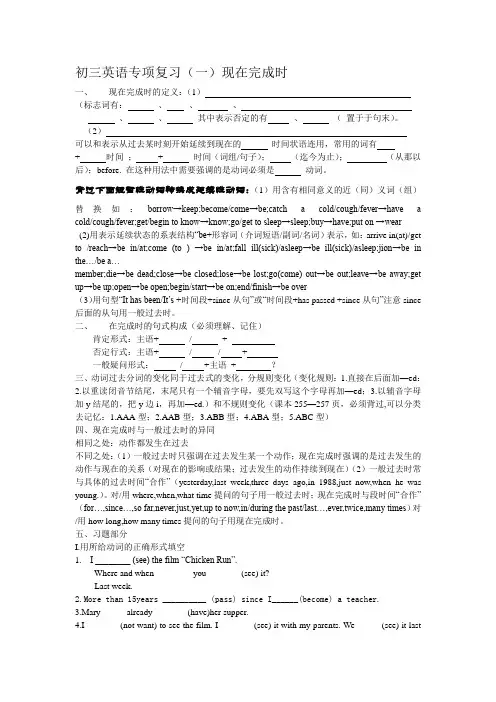
初三英语专项复习(一)现在完成时一、现在完成时的定义:(1)(标志词有:、、、、、其中表示否定的有、(置于于句末)。
(2)可以和表示从过去某时刻开始延续到现在的时间状语连用,常用的词有+ 时间;+ 时间(词组/句子);(迄今为止);(从那以后);before. 在这种用法中需要强调的是动词必须是动词。
背过下面短暂性动词转换成延续性动词:(1)用含有相同意义的近(同)义词(组)替换如:borrow→keep;become/come→be;catch a cold/cough/fever→have a cold/cough/fever;get/begin to know→know;go/get to sleep→sleep;buy→have;put on →wear (2)用表示延续状态的系表结构“be+形容词(介词短语/副词/名词)表示,如:arrive in(at)/get to /reach→be in/at;come (to ) →be in/at;fall ill(sick)/asleep→be ill(sick)/asleep;jion→be in the…/be a…member;die→be dead;close→be closed;lose→be lost;go(come) out→be out;leave→be away;get up→be up;open→be open;begin/start→be on;end/finish→be over(3)用句型“It has been/It’s +时间段+since从句”或“时间段+has passed +since从句”注意since 后面的从句用一般过去时。
二、在完成时的句式构成(必须理解、记住)肯定形式:主语+ / +否定行式:主语+ / / +一般疑问形式:/ +主语+ ?三、动词过去分词的变化同于过去式的变化,分规则变化(变化规则:1.直接在后面加—ed:2.以重读闭音节结尾,末尾只有一个辅音字母,要先双写这个字母再加—ed;3.以辅音字母加y结尾的,把y边i,再加—ed.)和不规则变化(课本255—257页,必须背过,可以分类去记忆:1.AAA型;2.AAB型;3.ABB型;4.ABA型;5.ABC型)四、现在完成时与一般过去时的异同相同之处:动作都发生在过去不同之处:(1)一般过去时只强调在过去发生某一个动作;现在完成时强调的是过去发生的动作与现在的关系(对现在的影响或结果;过去发生的动作持续到现在)(2)一般过去时常与具体的过去时间“合作”(yesterday,last week,three days ago,in 1988,just now,when he was young.)。
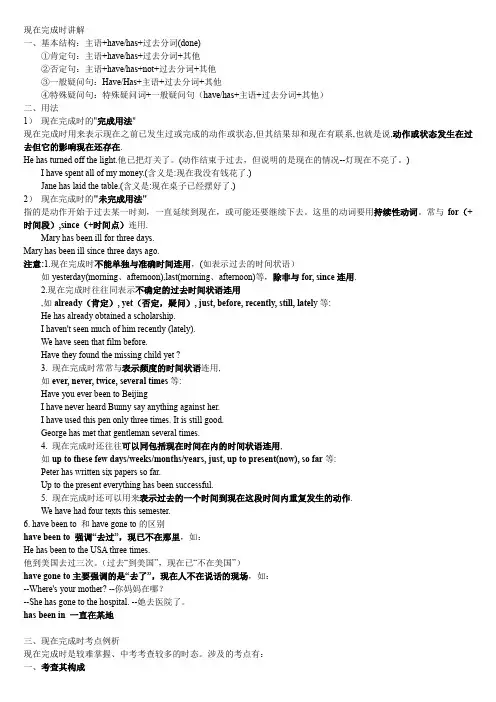
现在完成时讲解一、基本结构:主语+have/has+过去分词(done)①肯定句:主语+have/has+过去分词+其他②否定句:主语+have/has+not+过去分词+其他③一般疑问句:Have/Has+主语+过去分词+其他④特殊疑问句:特殊疑问词+一般疑问句(have/has+主语+过去分词+其他)二、用法1)现在完成时的"完成用法"现在完成时用来表示现在之前已发生过或完成的动作或状态,但其结果却和现在有联系,也就是说,动作或状态发生在过去但它的影响现在还存在.He has turned off the light.他已把灯关了。
(动作结束于过去,但说明的是现在的情况--灯现在不亮了。
)I have spent all of my money.(含义是:现在我没有钱花了.)Jane has laid the table.(含义是:现在桌子已经摆好了.)2)现在完成时的"未完成用法"指的是动作开始于过去某一时刻,一直延续到现在,或可能还要继续下去。
这里的动词要用持续性动词。
常与for(+时间段),since(+时间点)连用.Mary has been ill for three days.Mary has been ill since three days ago.注意:1.现在完成时不能单独与准确时间连用,(如表示过去的时间状语)如yesterday(morning、afternoon),last(morning、afternoon)等,除非与for, since连用.2.现在完成时往往同表示不确定的过去时间状语连用,如already(肯定), yet(否定,疑问), just, before, recently, still, latel y等:He has already obtained a scholarship.I haven't seen much of him recently (lately).We have seen that film before.Have they found the missing child yet ?3. 现在完成时常常与表示频度的时间状语连用,如ever, never, twice, several times等:Have you ever been to BeijingI have never heard Bunny say anything against her.I have used this pen only three times. It is still good.George has met that gentleman several times.4. 现在完成时还往往可以同包括现在时间在内的时间状语连用,如up to these few days/weeks/months/years, just, up to present(now), so far等:Peter has written six papers so far.Up to the present everything has been successful.5. 现在完成时还可以用来表示过去的一个时间到现在这段时间内重复发生的动作.We have had four texts this semester.6. have been to 和have gone to的区别have been to 强调“去过”,现已不在那里,如:He has been to the USA three times.他到美国去过三次。

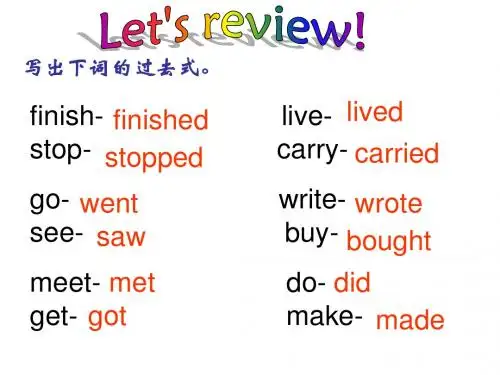
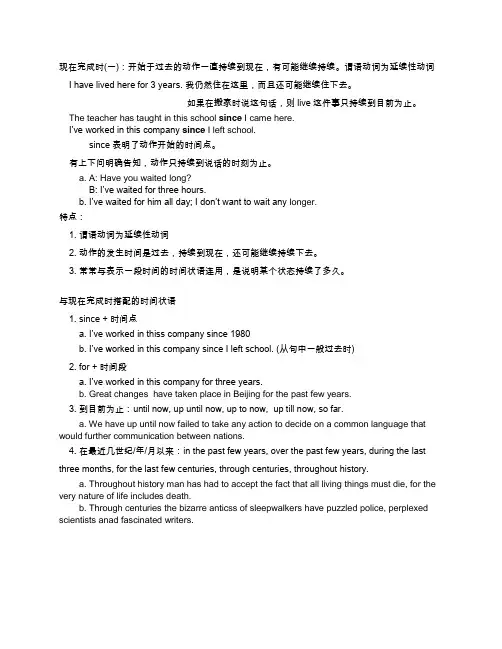
现在完成时(一):开始于过去的动作一直持续到现在,有可能继续持续。
谓语动词为延续性动词 I have lived here for 3 years. 我仍然住在这里,而且还可能继续住下去。
如果在搬家时说这句话,则live这件事只持续到目前为止。
The teacher has taught in this school since I came here.I’ve worked in this company since I left school.since表明了动作开始的时间点。
有上下问明确告知,动作只持续到说话的时刻为止。
a. A: Have you waited long?B: I’ve waited for three hours.b. I’ve waited for him all day; I don’t want to wait any longer.特点:1. 谓语动词为延续性动词2. 动作的发生时间是过去,持续到现在,还可能继续持续下去。
3. 常常与表示一段时间的时间状语连用,是说明某个状态持续了多久。
与现在完成时搭配的时间状语1. since + 时间点a. I’ve worked in thiss company since 1980b. I’ve worked in this company since I left school. (从句中一般过去时)2. for + 时间段a. I’ve worked in this company for three years.b. Great changes have taken place in Beijing for the past few years.3. 到目前为止:until now, up until now, up to now, up till now, so far.a. We have up until now failed to take any action to decide on a common language that would further communication between nations.4. 在最近几世纪/年/月以来:in the past few years, over the past few years, during the last three months, for the last few centuries, through centuries, throughout history.a. Throughout history man has had to accept the fact that all living things must die, for the very nature of life includes death.b. Through centuries the bizarre anticss of sleepwalkers have puzzled police, perplexed scientists anad fascinated writers.现在完成时(二):过去发生但与现在仍有联系的动作或状态a. He has broken his leg. 他现在还在医院,所以不能和同学一起郊游。
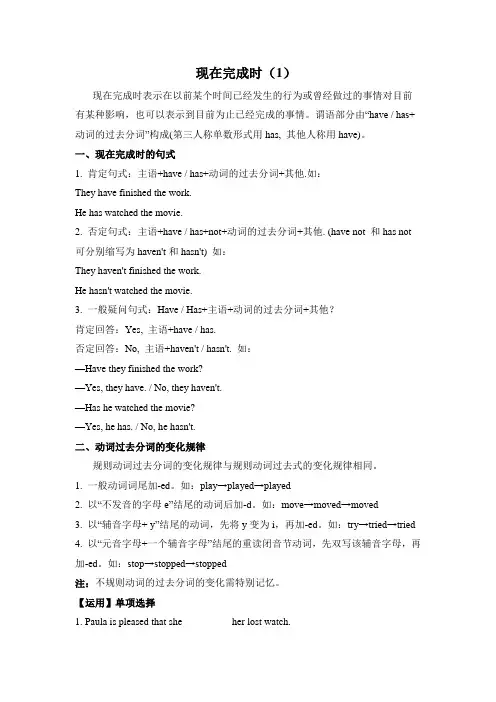
现在完成时(1)现在完成时表示在以前某个时间已经发生的行为或曾经做过的事情对目前有某种影响,也可以表示到目前为止已经完成的事情。
谓语部分由“have / has+动词的过去分词”构成(第三人称单数形式用has, 其他人称用have)。
一、现在完成时的句式1. 肯定句式:主语+have / has+动词的过去分词+其他.如:They have finished the work.He has watched the movie.2. 否定句式:主语+have / has+not+动词的过去分词+其他. (have not 和has not 可分别缩写为haven't和hasn't) 如:They haven't finished the work.He hasn't watched the movie.3. 一般疑问句式:Have / Has+主语+动词的过去分词+其他?肯定回答:Yes, 主语+have / has.否定回答:No, 主语+haven't / hasn't. 如:—Have they finished the work?—Yes, they have. / No, they haven't.—Has he watched the movie?—Yes, he has. / No, he hasn't.二、动词过去分词的变化规律规则动词过去分词的变化规律与规则动词过去式的变化规律相同。
1. 一般动词词尾加-ed。
如:play→played→played2. 以“不发音的字母e”结尾的动词后加-d。
如:move→moved→moved3. 以“辅音字母+ y”结尾的动词,先将y变为i,再加-ed。
如:try→tried→tried4. 以“元音字母+一个辅音字母”结尾的重读闭音节动词,先双写该辅音字母,再加-ed。
如:stop→stopped→stopped注:不规则动词的过去分词的变化需特别记忆。
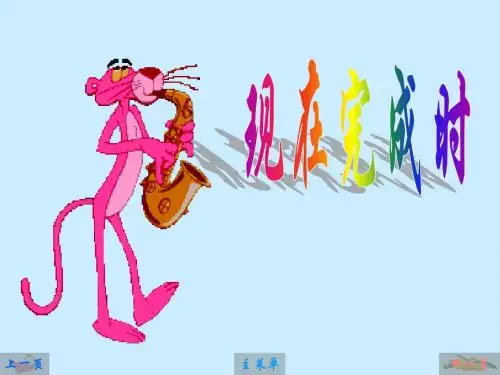
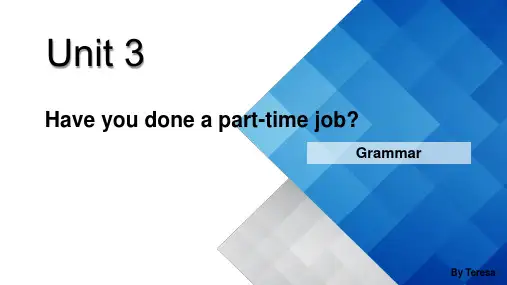
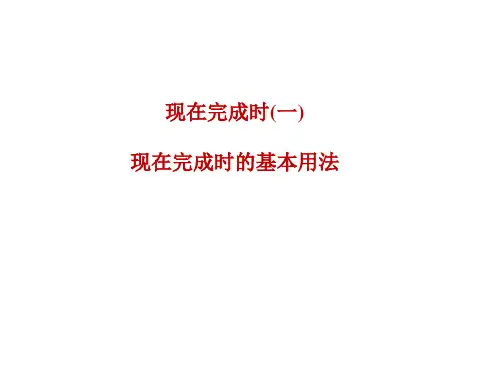
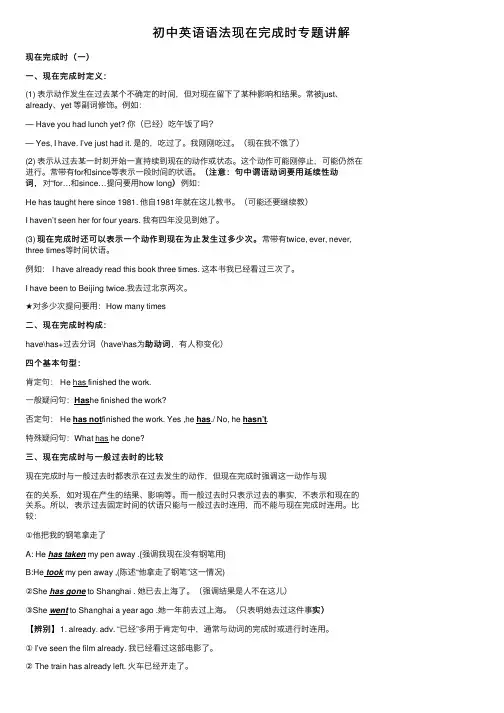
初中英语语法现在完成时专题讲解现在完成时(⼀)⼀、现在完成时定义:(1) 表⽰动作发⽣在过去某个不确定的时间,但对现在留下了某种影响和结果。
常被just、already、yet 等副词修饰。
例如:— Have you had lunch yet? 你(已经)吃午饭了吗?— Yes, I have. I’ve just had it. 是的,吃过了。
我刚刚吃过。
(现在我不饿了)(2) 表⽰从过去某⼀时刻开始⼀直持续到现在的动作或状态。
这个动作可能刚停⽌,可能仍然在(注意:句中谓语动词要⽤延续性动进⾏。
常带有for和since等表⽰⼀段时间的状语。
(注意:句中谓语动词要⽤延续性动词,对“for…和since…提问要⽤how long)例如:词,He has taught here since 1981. 他⾃1981年就在这⼉教书。
(可能还要继续教)I haven’t seen her for four years. 我有四年没见到她了。
现在完成时还可以表⽰⼀个动作到现在为⽌发⽣过多少次。
常带有twice, ever, never, (3) 现在完成时还可以表⽰⼀个动作到现在为⽌发⽣过多少次。
three times等时间状语。
例如: I have already read this book three times. 这本书我已经看过三次了。
I have been to Beijing twice.我去过北京两次。
★对多少次提问要⽤:How many times⼆、现在完成时构成:have\has+过去分词(have\has为助动词助动词,有⼈称变化)四个基本句型:肯定句: He has finished the work.⼀般疑问句:Has he finished the work?否定句: He has not finished the work. Yes ,he has./ No, he hasn’t.特殊疑问句:What has he done?三、现在完成时与⼀般过去时的⽐较现在完成时与⼀般过去时都表⽰在过去发⽣的动作,但现在完成时强调这⼀动作与现在的关系,如对现在产⽣的结果、影响等。
现在完成时与现在完成进行时现在完成时和现在完成进行时现在完成时(Present Perfect Tense)和现在完成进行时(Present Perfect Progressive Tense)是英语中两种重要的时态形式。
本文将对这两种时态进行解释和比较,并提供一些例句来帮助读者更好地理解和应用。
一、现在完成时(Present Perfect Tense)1.定义和结构现在完成时用来表示过去发生的动作或事件对现在造成的影响或结果。
它的结构由助动词“have/has”和过去分词形式的动词构成。
2.用法(1)表示过去发生的动作或事件对现在造成的影响或结果。
例如:- I have finished my homework.(我已经完成了我的作业。
)- They have moved to a new city.(他们已经搬到了新城市。
)(2)表示过去发生的动作或事件在现在仍然持续或存在。
例如:- I have lived in this city for five years.(我在这个城市已经住了五年了。
)- She has known him since childhood.(她从小就认识他。
)(3)表示过去曾经发生过的但时间不明确的动作或事件。
例如:- Have you ever been to Paris?(你曾经去过巴黎吗?)- He has read a lot of books.(他读过很多书。
)3.例句(1)肯定句:- I have seen that movie before.- We have visited the museum many times.- They have already finished their dinner.(2)否定句:- She hasn't finished her work yet.- He hasn't traveled abroad.- They haven't bought a new car.(3)疑问句:- Have you ever been to Japan?- Has she finished her presentation?- Have they seen this movie?二、现在完成进行时(Present Perfect Progressive Tense)1.定义和结构现在完成进行时用来表示发生在过去某段时间内一直持续的动作或事件。
现在完成时与一般过去时的区别例句现在完成时与一般过去时是英语中两种不同的时态,它们在使用和含义上有很大的区别。
现在完成时通常表示一种与当前时刻有关的动作或状态,而一般过去时则表示过去某个具体时间发生的动作或状态。
在本文中,我们将对这两种时态做一个详细的比较,并通过例句来帮助读者更好地理解它们之间的差异。
现在完成时(Present Perfect Tense)是一种表示过去动作对现在造成影响的时态。
它通常由have/has +过去分词构成。
例如:“I have finished my homework.”(我已经完成了我的作业。
)在这个句子中,完成的动作是在过去发生的,但它对当前的状态产生了影响,即我的作业已经完成了。
另一方面,一般过去时(Simple Past Tense)用于表示在过去某个具体时间发生的动作或状态。
它通常由动词的过去式构成。
例如:“I finished my homework yesterday.”(昨天我完成了我的作业。
)在这个句子中,完成的动作发生在昨天这个具体的时间点上。
为了更好地理解这两个时态的区别,让我们通过一些例句来进一步说明:现在完成时:1. I have lived in this city for five years.(我在这个城市住了五年了。
)2. She has lost her keys.(她丢了她的钥匙。
)3. We have eaten dinner already.(我们已经吃过晚饭了。
)一般过去时:1. I lived in this city for five years.(我在这个城市住了五年。
)2. She lost her keys yesterday.(她昨天丢了她的钥匙。
)3. We ate dinner at 7 o'clock last night.(昨晚我们7点吃了晚饭。
)从上面的例句可以看出,现在完成时强调的是动作的延续性,或者对当前状态的影响,而一般过去时则强调的是动作发生的具体时间。
现在完成时讲解与练习如果你想说“我已经看过某部电影,所以不想看了”、“某人曾经做过什么事情”等等,该如果表达呢?首先请看下面的句子:(1)I have seen the film. I don’t want to see it again.这部电影我已经看过,不想再看了。
(2)Have you answered all the questions? 所有的问题你都回答了吗?(3)Have you ever looked at a travel brochure?你看过旅游宣传册吗?(4)She has never visited the USA.她从没有过去美国。
观察:以上句子的谓语动词的一个共同特点是_____________________________, 用于表示在以前的某个时间曾经做过的、发生的事情,这种行为对目前有某种影响。
我们把这种时态称为“现在完成时”。
一、现在完成时的概念。
①现在完成时通常表示在说话之前已经完成的动作或存在的状态。
说话人强调的是该动作或状态对现在的结果或影响。
She has bought a car 她买了一辆车。
She has arrived. 她到了。
② 表示从过去某一时间开始一直持续到现在的动作或状态。
We've known each other since we were children. (我们从小就认识。
)I have been a member of the Party for 10 years.二、构成:”助动词have, has + 过去分词”现在完成时态的肯定句、否定句和疑问句形式(以work为例):练. 把下面变否定句、一般疑问句并作肯定和否定回答。
1. I have done my homework.否定句:_______________________________________一般疑问句:___________________________________回答:_________________________________________2. The plane has arrived.否定句:_______________________________________一般疑问句:___________________________________回答:_________________________________________三、现在完成时用法归纳1. 现在完成时表示过去发生的动作现已完成,对现在造成的影响和结果。